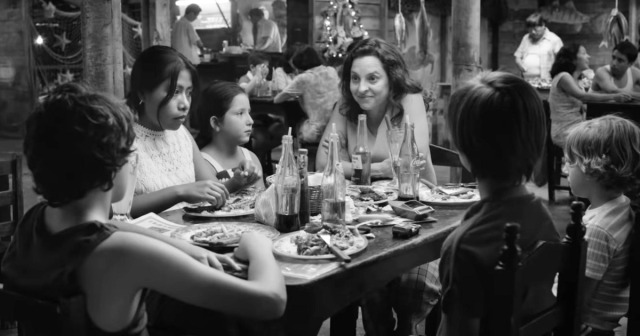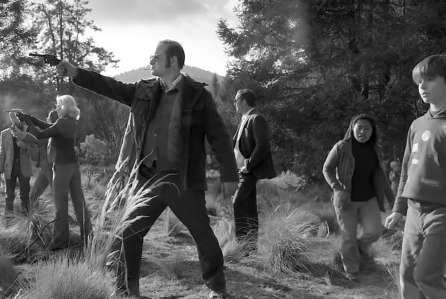
The great Mexican director Alfonso Cuarón has made a long, sprawling and semi-autobiographical movie memoir for Netflix, filmed in black and white and titled “Roma” in homage to Federico Fellini, the Italian master of the personal, the wry and the whimsical.
But if you’ve followed Cuarón from “Y Tu Mamá También” through “Children of Men,” “Harry Potter and the Prisoner of Azkaban” and “Gravity,” you know “whimsy” and “wry” aren’t of interest to him. He substitutes layer upon layer of detail and dramatic incidents, large and small in this long, intimate and slow reverie.
In filtering Mexican history of the early 1970s through the lens of his own upbringing, he doesn’t find much that’s funny or satiric in that time, a country roiled by the aftershocks of the ’60s, an upper class family disintegrating, a big house and comfy lifestyle teetering into decline, all of it held together by an impoverished Mixtecan maid and nanny, Cleo.
A native of Oaxaca, Cleo (Yalitza Aparcio) is short, with Indian features. Always smiling, she sings the three little boys and little girl of the house awake in the morning, shepherds the big dog most everybody else ignores and keeps him from making a break for it whenever the gate opens and takes the abuse from the mistress of the house (Marina de Tavira) and her surgeon husband (Fernando Grediaga) about the piles and piles of dog feces littering the courtyard that serves as their carport.
The house, from its cluttered kids’ rooms to crumb-littered tables, is getting away from her and from her friend and confidante, Adela (Nancy García García) the cook.
Señor Antonio (Grediaga) grouses about the poop, and keeps arguing with his wife about this “conference” he is going to in Canada. That’s for the kids. He’s got a mistress and he’s leaving them.
Outside their gates, marching bands of teen scouts can’t gloss over a country on the brink of chaos. Students are taking to the streets, and all the matriarch (Verónica García) and others in the house can do is pray (in Spanish with English subtitles) “that this time the Army doesn’t shoot any of them.”
Mom is desperate for distractions, pushing the kids whom she has not told Daddy’s left into writing him letters “in Canada” to “please come home.” A holiday trip and family reunion in the country is chaotic, fun and dramatic in the under-supervised carelessness young and old display in a shooting party and the forest fire the careless use of fireworks sets off.

But Cleo has her own life, beyond light-hearted sprints to the market and the odd moment of pleasure the unruly, demanding children give her. She is easily seduced by the man-child Fermín (Jorge Antonio Guerrero), who impresses her with his martial arts sword-training bravado, nude and using a shower curtain rod for his sword. He’s cheap and fanatical about more than just martial arts, it will turn out.
Cleo? She finds herself pregnant in the middle of all this chaos, her responsibilities growing as every whim of Señora Sofia (Tavira) means more work and challenges for her.
Cuarón loses himself in recreating this world of vintage Fiats, Fords, VW Beetles and street vendors in a washed-out (video transfer?), limited contrast black and white.
The whistle of the traveling knife-sharpener, the bark of hawkers of candy, toys, clothes and tamales whirls through the soundtrack in ways that will give your Surround Sound a workout.
The roar of a protest brutally broken up by police, producing a riot, and the thunder of the Gulf of Mexico beaches near Veracruz are contrasted with the quiet banality of tedious, hard work — scrubbing poop-stained floors, hand-washing clothes on the roof, waking sleeping children or reining in an unruly dog.
Cuarón finds cruel fun at the expense of the cluelessly cruel Fermín, and laughs in the willfully bad driving of Sra. Sofia — who abuses cars as the man who paid for them is not there to stop her.
But as “Roma” slowly washes over us, you can’t help but notice how every scene — many of them long-takes — carries on long past its payoff, how a 135 minute movie tends to overwhelm a story with just half a dozen dramatic moments in it — bracing though they may be — and other drama left unseen, off screen.
It’s an indulgent film, almost by definition. The “Roma” title and Fellini connection park it in a ’60s-70s cinema of “La Dolce Vita” and “Swept Away,” “Last Year at Marienbad” and “The Go Between” — languorous films whose auteurs refused to cut for clarity and dramatic impetus.
“Roma” is arty and beautiful, but also a bit like sitting on a sofa while Cuarón flips through family photo albums, never narrating or over-explaining any single moment or image.
It’s perfect for Netflix (Dec. 14) as it all but invites you to pause it, or at times, just leave the room for a snack and come back in. It moves that slowly.

MPAA Rating:R for graphic nudity, some disturbing images, and language
Cast:Yalitza Aparicio, Marina de Tavira, Diego Cortina Autrey, Carlos Peralta, Marco Graf
Credits:Written and directed by Alfonso Cuaraon. A Netflix release.
Running time: 2:15
